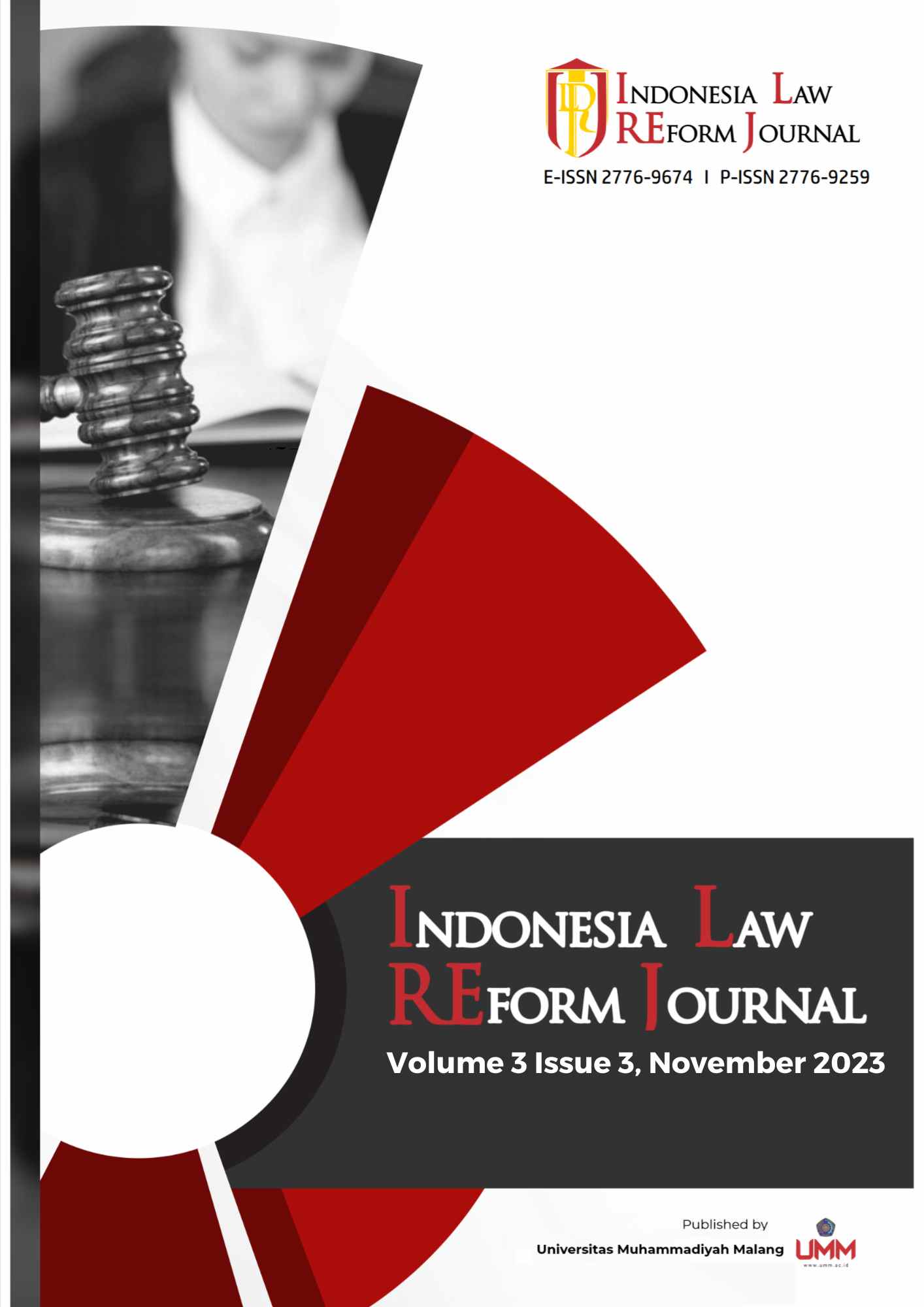The Incorporation of Customary Water Rules under the Ethiopian Formal Water Governance System: Clash of Values between Commodification and Preservation
DOI:
https://doi.org/10.22219/ilrej.v3i3.31995Keywords:
Water law of Ethiopia, Customary water rules, Formal water governance, sustainable developmentAbstract
Customary water rules need to be adequately incorporated into the Ethiopian formal water governance system despite their significance for ensuring sustainable and equitable utilization of scarce water resources. This research, using the textual analysis method and employing the theory of institutional incongruence, seeks to explore the extent of recognition of customary water rules under the formal water governance system of Ethiopia. The article argues that there needs to be more recognition of customary water rules under the Ethiopian formal water governance system, which has led to conflicts, inefficiencies, and unsustainable use of water resources. This is due to the value clash between the formal water rules built on the notion of water as a resource for commodification and customary water rules that see water as a sacred and communal part of communities' sociocultural and ecological being. As a result of this value clash, customary water rules, however important sustainability tenets they might lend, are only easily amenable to the formal water governance framework in the first place, questioning its basic foundations. Strategies such as incorporating ecosystems-based approaches, recognizing and integrating traditional knowledge, and promoting participatory decision-making processes can assist in bridging the gaps between commodification and preservation values. This, in turn, requires and largely depends on finding the right balance between economic development and environmental sustainability. This entails a fundamental reconsideration of the very goals of the Ethiopian water resources management policy, proclamation and regulation.
Downloads
References
Aarnoudse, E, Alvar Closas, and Nicole Lefore. “Water User Associations: A Review of Approaches and Alternative Management Options for Sub-Saharan Africa,” 2018. https://doi.org/10.22004/ag.econ.284166.
Assefa, Ayalew Getachew. Customary Laws in Ethiopia: A Need for Better Recognition?: A Women’s Rights Perspective. Danish Institute for Human Rights, 2012.
Assembly, U N General. “United Nations Declaration on the Rights of Indigenous Peoples.” UN Wash 12 (2007): 1–18.
Awoke, Aymere, Abebe Beyene, Helmut Kloos, Peter L M Goethals, and Ludwig Triest. “River Water Pollution Status and Water Policy Scenario in Ethiopia: Raising Awareness for Better Implementation in Developing Countries.” Environmental Management 58, no. 4 (2016): 694–706. https://doi.org/10.1007/s00267-016-0734-y.
Bantider, Amare, Bamlaku Tadesse, Adey N Mersha, Gete Zeleke, Taye Alemayehu, Mohsen Nagheeby, and Jaime Amezaga. “Voices in Shaping Water Governance: Exploring Discourses in the Central Rift Valley, Ethiopia.” Water, 2023. https://doi.org/10.3390/w15040803.
Belay, Mehretie, and Woldeamlak Bewket. “TRADITIONAL IRRIGATION AND WATER MANAGEMENT PRACTICES IN HIGHLAND ETHIOPIA: CASE STUDY IN DANGILA WOREDA.” Irrigation and Drainage 62, no. 4 (October 1, 2013): 435–48. https://doi.org/https://doi.org/10.1002/ird.1748.
Chazournes, Laurence Boisson de, Makane Mbengue, Komlan Sangbana, and Mara Tignino. The UN Convention on the Law of the Non-Navigational Uses of International Watercourses: A Commentary. Oxford Commentaries on Interna, 2019.
Craig, Donna, and Elizabeth Gachenga. “The Recognition of Indigenous Customary Law in Water Resource Management.” Water Law 20, no. 5/6 (2010): 278.
Elizabeth Gachenga. “Integrating Customary and Statutory Law Systems of Water Governance for Sustainable Development: The Case of Marakwet of Kenya.” University of Western Sydney, 2012.
Ethiopia, Federal Democratic Republic of. “The Ethiopian Water Resources Management Policy.” Ministry of Water Resources, 1998. https://faolex.fao.org/docs/pdf/eth158196a.pdf.
Federal Democratic Republic of Ethiopia. “Civil Code of the Federal Democratic Republic of Ethiopia.” Proclamation No. 165/1960, Negarit Gazttee 19, no. 2 (1960).
———. “Constitution of the Federal Democratic Republic of Ethiopia.” Proclamation No. 1/1995, Federal Negarit Gazttee 1, no. 1 (1995).
———. “Water Resources Management Proclamation.” Proclamation Number 197/2000, Federal Negarit Gazettee 6, no. 25 (1998).
———. “Water Resources Management Regulation.” Regulation Number 115/2005, Federal Negarit Gazettee 11, no. 27 (2005).
Ftaïta, Toufik. “Community Water Management. Is It Still Possible? Anthropological Perspectives.” Anuário Antropológico, no. v.36 n.1 (December 1, 2011): 195–212. https://doi.org/10.4000/aa.1161.
Gachenga, Elizabeth. “Customary Law Systems for Water Governance and the Human Rights Based Approach to Water: A Case of Marakwet of Kenya.” Strathmore University, 2013. https://su-plus.strathmore.edu/server/api/core/bitstreams/d6ffe6d9-cd0f-48f3-8f60-2225b35385bd/content.
GLEICK, PETER H. “The World’s Water 1998--1999: The Biennial Report on Freshwater Resources.” Population and Development Review 25 (March 11, 1999): 815. https://link.gale.com/apps/doc/A63296791/AONE?u=anon~2c9f6ece&sid=googleScholar&xid=27ba03d9.
Hailu, Reta, Degefa Tolossa, and Getnet Alemu. “Water Institutions in the Awash Basin of Ethiopia: The Discrepancies between Rhetoric and Realities.” International Journal of River Basin Management 16, no. 1 (January 2, 2018): 107–21. https://doi.org/10.1080/15715124.2017.1387126.
Henkel, David S. “Community-Based Water Systems: Preserving Livelihood, Ecology, and Community.” Human Ecology Review 20, no. 2 (March 11, 2014): 75–95. http://www.jstor.org/stable/24707627.
Kliot, N, D Shmueli, and U Shamir. “Institutions for Management of Transboundary Water Resources: Their Nature, Characteristics and Shortcomings.” Water Policy 3, no. 3 (2001): 229–55. https://doi.org/10.1016/S1366-7017(01)00008-3.
Koppen, B. van. “Living Customary Water Tenure in Rights-Based Water Management in Sub-Saharan Africa.” Colombo, Sri Lanka, 2022. https://doi.org/10.5337/2022.214.
Koppen, Barbara Van. “Integrated Water Resource Management in Tanzania: Interface between Formal and Informal Institutions,” 2005. https://doi.org/10.22004/ag.econ.158022.
Madga Nassef & Mulugeta Belayhun. “Water Development in Ethiopia’s Pastoral Areas: A Synthesis of Existing Knowledge and Experience.” USA, 2012.
Maganga, Faustin P. “Incorporating Customary Laws in Implementation of IWRM: Some Insights from Rufiji River Basin, Tanzania.” Physics and Chemistry of the Earth, Parts A/B/C 28, no. 20 (2003): 995–1000. https://doi.org/10.1016/j.pce.2003.08.011.
Nowlan, Linda. “Customary Water Laws and Practices in Canada,” 2004. https://www.fao.org/fileadmin/templates/legal/docs/CaseStudy_Canada.pdf, .
Ramazzotti, Marco. “Customary Water Rights and Contemporary Water Legislation.” FAO Legal Papers Online 76 (2008).
Rubiños, Cathy, and Maria Bernedo Del Carpio. “Institutional Fit in the Water Sector.” In Oxford Research Encyclopedia of Environmental Science. Oxford University Press, 2022. https://doi.org/10.1093/acrefore/9780199389414.013.787.
TAMRAT, IMERU. “Policy and Legal Framework for Water Resources Management in Ethiopia.” In Conference on Water Management in Federal and Federal Types Countries, Zaragoza, 2008.
Tremblay, Hugo. “A Clash of Paradigms in the Water Sector? Tensions and Synergies Between Integrated Water Resources Management and the Human Rights-Based Approach to Development.” SSRN Electronic Journal, 2010. https://doi.org/10.2139/ssrn.1661146.
Troell, Jessica, and Stephanie Keene. “Legal Recognition of Customary Water Tenure in Sub-Saharan Africa: Unpacking the Land-Water Nexus.” Colombo, Sri Lanka, 2022. https://doi.org/10.5337/2022.215.
Woodhouse, P, and M Muller. “Water Governance—An Historical Perspective on Current Debates.” World Development 92 (2017): 225–41. https://doi.org/10.1016/j.worlddev.2016.11.014.
Zerfu, Getachew. “Management Aspects of Rural Water Sustainability in Ethiopia.” International Institute for Infrastructural, Hydraulic and Environmental Engineering, 2013.
Downloads
Published
How to Cite
Issue
Section
License
Copyright (c) 2024 Temesgen Degu

This work is licensed under a Creative Commons Attribution-ShareAlike 4.0 International License.











